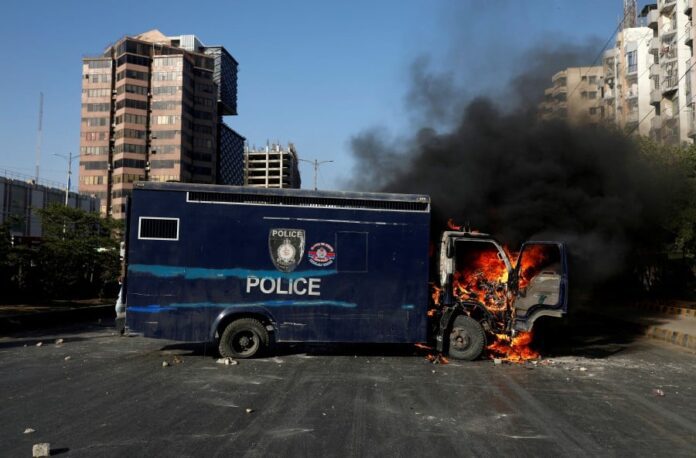The article discusses political violence and hooliganism in Pakistan, arguing that it poses a threat to democracy and progress in the country. The author emphasizes the need for political leaders to denounce such activities and promote peaceful means to resolve political issues.
Pakistan has witnessed numerous instances of vandalism and hooliganism by supporters of various political leaders. The recent violence and destruction of public property, including buses, roads, toll plazas, trains, and public and government buildings, by supporters of the former Prime Minister and Chief of the Pakistan Tehrik-e-Insaf (PTI) party, following his detention, is a clear example of such actions. Such incidents not only pose a threat to the rule of law but also undermine the economic and social progress of the country.
It is important to note that these acts cannot be justified under any circumstances. Violence and destruction of public property cannot be considered legitimate forms of political expression, and they only weaken the democracy that people are striving to build. These activities not only damage public infrastructure but also cause inconvenience and distress to the general public, who are already struggling with socio-economic challenges.
All parties and political leaders must denounce such violent activities and urge people to express their opinions through peaceful means. The leaders should also take responsibility and ensure that their followers do not engage in any unlawful activities. Political leaders need to understand that they have a moral and legal obligation to ensure that their supporters respect the law and do not engage in activities that harm the country.
While the situation is grave and unlawful arrests of political leaders like Imran Khan entail serious consequences for the essence of democracy in Pakistan, civil-military nexus, and public mistrust in the state institutions, there are peaceful means to strengthen advocacy as true proponents of democracy and followers of a leader who has gained unprecedented support in the history of Pakistan and aims at putting an end to the regressive culture of dynastic politics.
Some of these peaceful means include engaging in constructive dialogues and negotiations with the government and other stakeholders, taking peaceful legal action to address concerns about the legitimacy of the government or the electoral process, using peaceful advocacy and awareness campaigns to highlight issues of concern, and engaging in community service and volunteering activities to improve local communities and contribute positively to society.
In conclusion, the recent incidents of hooliganism and political violence in Pakistan are a clear indication of the lack of respect for the rule of law and the democratic process. It is time for political leaders to recognize the gravity of the situation and take a firm stand against such actions. While peaceful advocacy and constructive dialogue are necessary to strengthen democracy, political leaders must also take responsibility for the actions of their supporters and ensure that they do not engage in unlawful activities. It is only through peaceful means and a commitment to democracy that Pakistan can progress towards a more prosperous and inclusive future. The citizens of Pakistan deserve a better future, and it is up to the leaders to create the conditions necessary for progress and development. It is time for Pakistan to embrace a new era of democratic values and principles, one where political violence and hooliganism have no place.




